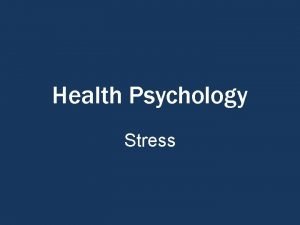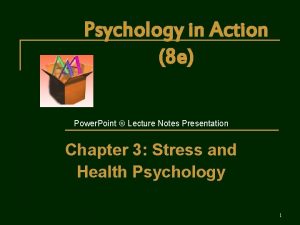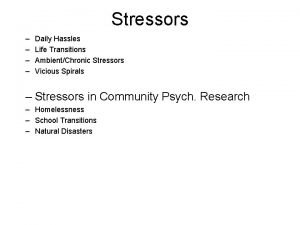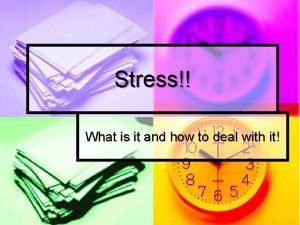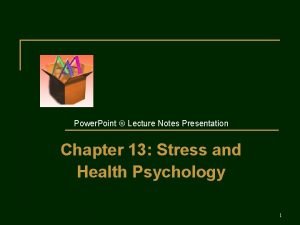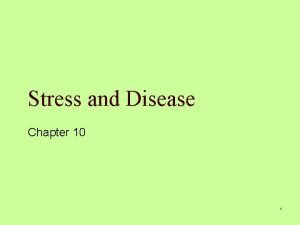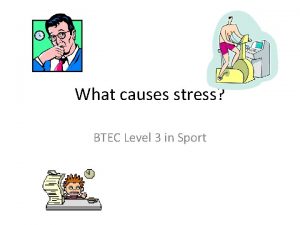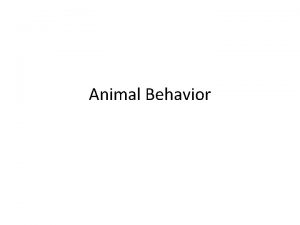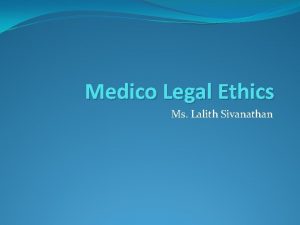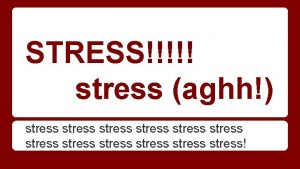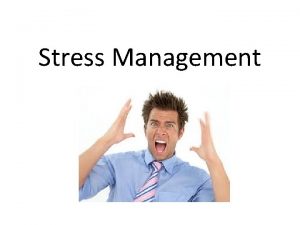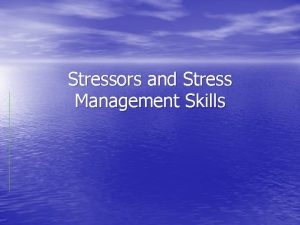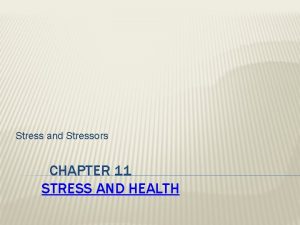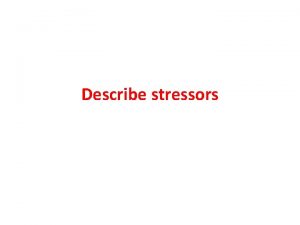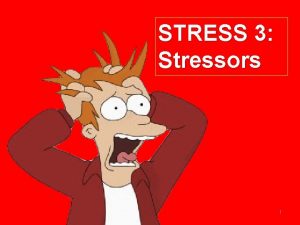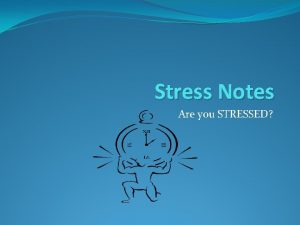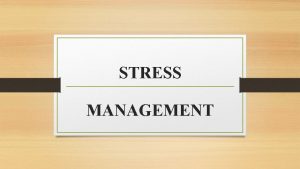Stress Management Lalith Sivanathan Content Definition Stressors Causes

















- Slides: 17

Stress Management Lalith Sivanathan

Content �Definition �Stressors �Causes of stressors �Response to stressors �How to handle stress �Stress reducing techniques �Points to remember

Stress �Stress is the body’s reaction to any stimulus that requires a person to adjust to a changing environment. �Change always initiates stress. �The stimuli (an event) to change, alter behavior, or adapt to a situation are stressors.

Stress �Stressors can be caused by internal or external forces. �Internal stress – “heart attack, ” cancer �External stress – new job, marriage, divorce, test. �No matter what the cause, a stressor will cause the body to go into alarm or warning mode…. . the “fight or flight” response. � The sympathetic nervous system prepares the body for action by releasing the hormone adrenaline into the blood stream.

Stressors cause �Body goes into an alarm mode �Sympathetic nervous system works OT �Adrenaline released (hormone from adrenals) �Blood vessels to heart & brain dilate �Pupils in eye dilate �Saliva decreases �Heart beats faster, blood pressure rises, respiratory rate increases �Actions provide body with burst of energy & stamina required to respond to stressor

Causes of stress �Relationships �Job or school �Foods – caffeine, salt, sweets �Illness & lifestyle �Finances �Family events – birth, death, marriage, divorce �Overwork, boredom, negative feelings �Time limitations – too much to do �Failure to achieve goals

Stress �Not all stress is harmful. �A small amount of stress is essential to an individual’s well-being because it makes the person more alert and raises the energy level. �Stress can cause positive feelings such as excitement, anticipation, self-confidence, and a sense of achievement.

Response to stressors �If stress causes positive feelings, it can be helpful (achievement, excitement, anticipation, etc) �If stress causes negative feelings, it can be harmful (boredom, frustration, irritability, anger, depression, distrust, self-criticism, exhaustion)

Negative Stress �Can lead to substance abuse �Smoking, alcohol use, drug use, excessive eating �Trying to find comfort & escape from negative feelings �Can lead to mental breakdown �Be aware of stressors & learn to control them

Stress �Working in health care can be very stressful. Sometimes you will deal with life and death situations. �How do you handle stress?

Stress – How can you handle it? �Stop: immediately stop what you are doing to break out of the stress response. �Breathe: take a slow deep breath to relieve the physical tension. �Reflect: think about the problem and the cause of the stress. �Choose: determine how you want to deal with the stress.

Steps to control stress �Identify stressors �Awareness of stressor & how you deal with it, can you change it? �Solve or eliminate the problem �Gather info, assess situation, identify problem, list possible solutions, make a plan, act on solution, evaluate results, change solution if necessary

Stress-reducing techniques �Live a healthy life – diet, exercise, rest �Take a break from stressors �Take a warm bath �Escape to quiet music or book �Relieve tension – slow deep breaths �Rely on others – talk to a friend �Meditate & use imagery �Enjoy yourself & Renew yourself �Think positively �Develop outside interests �Seek assistance & delegate, say NO

Stress �Everyone experiences �Amount of stress depends on the individual reaction to & perception of the situation �Example – blood test can be stressful for some, but routine for another

After the stress is over �Parasympathetic nervous system works �Opposite reactions cause fatigue or exhaustion while body recovers �If body is subjected to constant stress, normal body functions are disrupted �Can result in serious illness or disease �Migraine headaches, anxiety reactions, depression, allergies, asthma, digestive disorders, hypertension, insomnia, heart disease

Remember �Stress is a constant presence & cannot be avoided �Be aware of causes & learn how to respond when a stress reaction occurs �Solve problems effectively �Practice techniques to reduce the effect of stress �Patients also can experience stress as they deal with their illness

Thank you…
 Lalith suresh
Lalith suresh Problem focused coping examples
Problem focused coping examples Walter cannon observed that a variety of stressors trigger
Walter cannon observed that a variety of stressors trigger Consolidation of stressors
Consolidation of stressors Types of stressors life orientation
Types of stressors life orientation Stressors
Stressors Life stressors
Life stressors Walter cannon observed that a variety of stressors trigger
Walter cannon observed that a variety of stressors trigger Chapter 10 stress responses and stress management
Chapter 10 stress responses and stress management What is esp
What is esp Dynamic content vs static content
Dynamic content vs static content True stress and engineering stress
True stress and engineering stress Define axial stress
Define axial stress Personal causes of stress in sport
Personal causes of stress in sport Which type of stress causes fault-block mountains?
Which type of stress causes fault-block mountains? Reverse fault
Reverse fault Proximate and ultimate behavior examples
Proximate and ultimate behavior examples Proximate and ultimate behavior examples
Proximate and ultimate behavior examples

